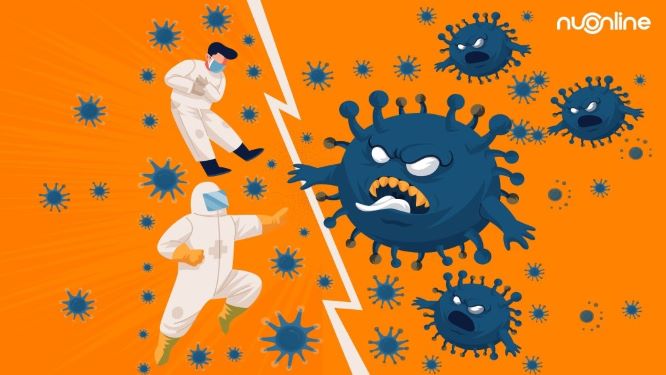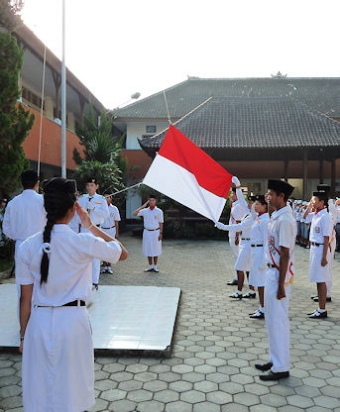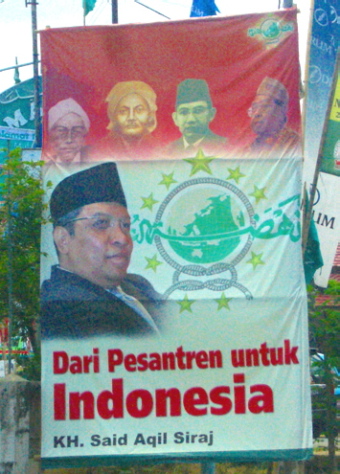The pandemic is posing unprecedented challenges for Muslims this fasting month of Ramadan
Mark Woodward
Indonesia was ill-prepared for the COVID-19 pandemic. The fact that few cases were reported until late March speaks more for the government’s failure or inability to take adequate steps to locate them than epidemiological realities. On 2 February, Health Minister Terawan Agus Putranto naively stated that the power of payer would protect Indonesia from the pandemic. The first case was officially reported on 2 March. By the end of March, the number of reported cases surpassed 1,400. By 12 April it had passed 4,000. By 21 April the total number had exceeded 7,000 with more deaths than any Asian country except China. Indonesian governments at local and national levels were slow to respond. It was not until 21 April that Ramadan travel was prohibited.
The pandemic is posing unprecedented challenges for Muslims with the fasting month of Ramadan beginning on 23 April. Muslim organisations including Muhammadiyah and Nahdlatul Ulama (NU) realised the extent of the health crisis much more quickly. NU moved to alter customary Ramadan activities for these challenging circumstances to prevent them from becoming venues for transmitting the contagion. NU faces a unique, vexing set of challenges for two reasons. The first is organisational. NU is a loosely structured federation of independent religious boarding schools (pesantren) each led by a charismatic Muslim scholars (Kyai). Loyalties are as much, if not more, to individual Kyai than to the organisation. The second challenge was how to bring some sense of religious meaning to the COVID-19 pandemic.
Nahdlatul Ulama
NU was founded in 1926 in Surabaya in response to the Wahhabi conquest of Mecca. Many of its founding members, including K.H. Hasyim Asyari (1871-1947), had studied in the holy city for decades and were among the world’s most eminent Muslim scholars. NU has approximately eighty million members making it the largest Indonesian Muslim organisation. Most NU followers are Javanese or Madurese. There is a highly educated NU urban elite, but the majority of NU people are from villages and small towns. There are similar organisations in Lombok (Nahdlatul Wathan) and Sulawesi (As’adiyah).
Religiously, NU defines itself as Ahlussunnah wal Jama’ah (the community of the Prophet Muhammad). This is defined as Muslims who adhere to one of the four Sunni schools of Islamic jurisprudence, the theology of al-Asyari that stresses rational interpretation of the Qur’an, and the Shari’ah-centric Sufism (Islamic mysticism) of al-Ghazali (1058-1111) and al-Junaid (830-910). Saint veneration is a basic part of NU piety. Millions of NU Muslims make pilgrimages (ziyarah) to the shrines of the Wali Songo, the nine saints instrumental in making Islam the religion of Java. NU legal reasoning, including that concerning religious obligations is based on Shafi jurisprudence as well as on the application of principles derived from the Qur’an and Hadith (traditions concerning the Prophet Muhammad). NU actively promotes Javanese and other Indonesian Muslim cultural traditions, many of which include large scale public events.
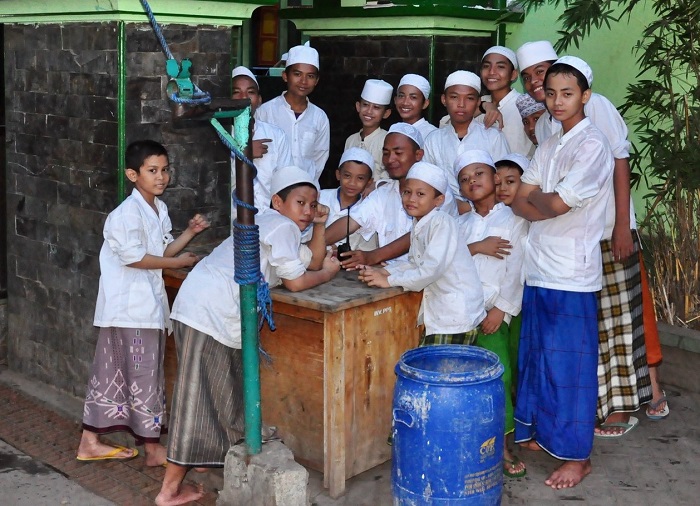
Prominent Kyai realised early on that social distancing would be necessary to contain the pandemic and that this requires adjustments to normal pesantren procedures and for individual Muslims to change their religious and social behaviour. As Ramadan approached Kyai who would usually have been preparing for the complex array of religious and social events that accompany the fast were concerned with responding to the pandemic and managing pesantren under extraordinary circumstances.
However, the reality is that Ramadan makes social distancing very difficult. It will be impossible to contain the pandemic if Muslims blithely continue with normal Ramadan observances. There is also a tendency to confuse religious acts (wajib) and customary religious and social practices which for NU include Nisfu Syaban prayers and visiting the graves (Nyadran) before Ramadan begins, (communal fast breaking (iftar/buka bersama), daily Ramadan markets, religious talks (pengajian), parades, parties, family gatherings, Id al-Fitri/Lebaran celebrations and most of all mudik that empties cities as people returns to their home towns and villages at the end of the month.
There are more than fifteen thousand pesantren in Indonesia. Most offer a combination of Islamic and modern secular education. Others teach only religious subjects. Pesantren provide a level of Islamic education on par with that at similar institutions in South Asia and the Middle East. Each is unique and reflects the specialisation of the leading kyai. Some offer basic Islamic education. Others provide advanced instruction in Islamic jurisprudence, Qur’an recitation, theology and Indonesian Muslim performance traditions. The number of santri ranges from less than one hundred to more than twenty thousand. Life in a pesantren is austere. As many as twenty students share a single room. Some sleep in the mosque because conditions are so crowed
NU, Pesantren, religious guidance and the coronavirus
NU’s response to the COVID-19 pandemic combines Shafi legal reasoning with medical pragmatism. It relies on the respect for the authority and wisdom of Kyai, shared among NU Muslims. NU and individual Kyai recognised that social distancing was the only way to contain the spread of the virus and that this required Muslims to change their social and religious behaviour. NU also established command posts across Indonesia to provide information about the pandemic and assistance to victims. In mid-March is set up posts to aid in disinfection efforts and collect food packets for victims and the poor.
At local and national levels NU offered guidance for how Muslims should conduct themselves while the pandemic persists.
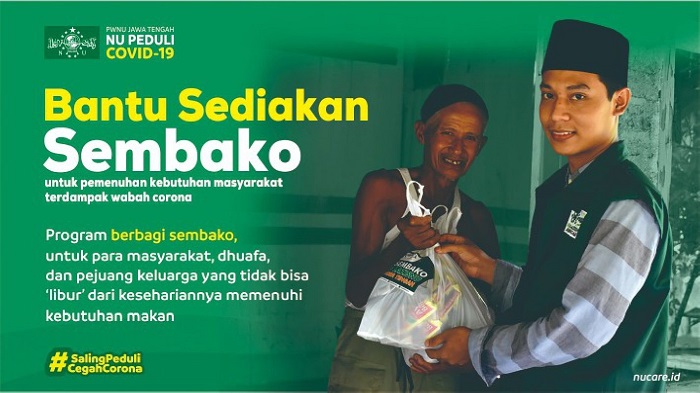
In mid-March the shrines of the Wali Songo were closed. On 28 March 28 the NU health agency advised Muslims to remain in place and not to return (mudik) to towns and villages for the Lebaran holiday. On 4 April the NU Central Board issued a directive stating that normal Ramadan activities must be curtained. It urged Muslims to hold tarawih, special evening Ramadan prayers at home instead of at mosques and to cancel collective Id al-Fitri prayers celebrating the conclusion of the fast.
On 9 April, NU held a massive on-line Nisfu Syaban prayer gathering, asking Allah to spare Indonesia from the COVID-19. More than 100,000 people participated. It was also broadcast on fourteen television channels. Nisfu Syaban is the 15th day of Syaban, a month before Ramadan. Many NU Muslims believe that Allah answers prayers said on that day. Tens of thousands of Nyadran Nisfu Syaban observances were cancelled. Some of these events are small family gatherings. Others, especially Nyadran at saint shrines are mass gatherings including thousands of people.
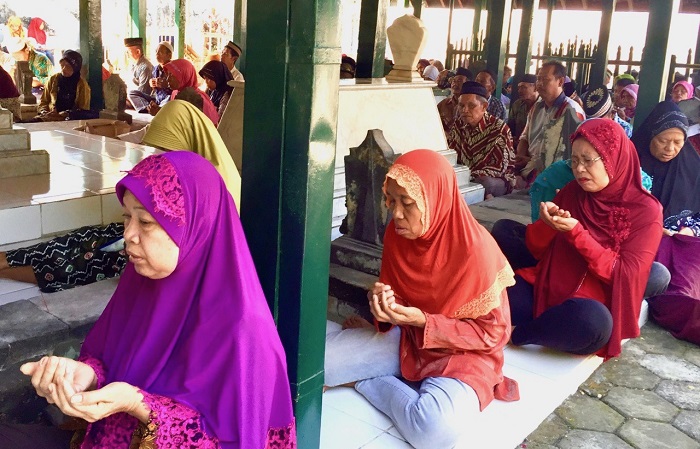
Pesantren leaders face a particularly difficult dilemma. Crowded conditions make pesantren particularly vulnerable locations for spreading the coronavirus. Normally Ramadan is vacation time for santri. To allow them to return home risks expanding the pandemic. Sheltering santri ‘in place’ risks spreading the virus in areas where medical services are rudimentary. Some Kyai chose to start the Ramadan vacation early. Lirboyo, one of the largest pesantren, provided medical screening and treatment for students before sending them home. Others chose to keep santri in place and limit contact with outsiders in to establish their pesantren as virus free areas. These are difficult choices. Both reflect the deep concern that Kyai have for their santri.
Victims as martyrs
Just how many Indonesians have perished from COVID-19 is uncertain. What is certain that more will perish in the weeks and months to come. NU has offered guidance and solace to friends and families by declaring that those who have died are martyrs (shahid), who will reap heavenly rewards for their suffering. Numerous statements mention this hadith to explain who those who perish from COVID-19 have achieved this rank.
The Prophet Muhammad asked his companions:
“Who are the martyrs among you? They replied: “Those who died on the battlefield are martyrs.” The Prophet responded: “In that case, very few of my people were martyred.” The companions asked: “Then who are they?” The Prophet answered: “People who die on the battlefield are martyrs, people who die in the way of Allah (not because of war) are also martyrs, people who are struck down by plague are martyred, people who die from stomach illnesses are also martyrs and people who drown are martyrs.”
Mark Woodward (mark.woodward@asu.edu) is Research Professor at the Center for the Study of Religion and Conflict at Arizona State University.

